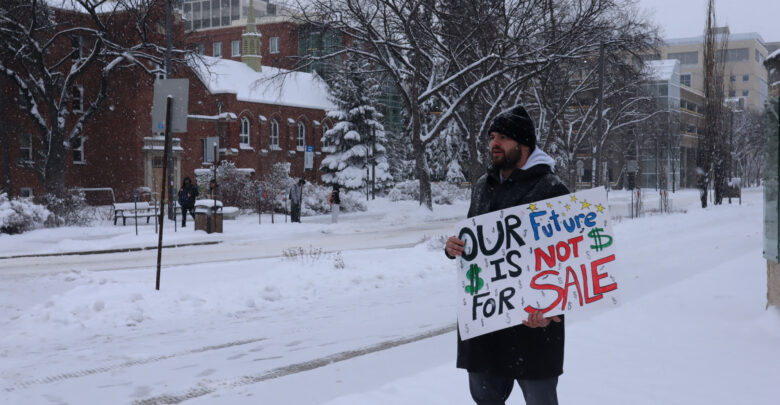BoG approves tuition increases for the sixth consecutive year
All domestic students will see a tuition increase of two per cent and international students beginning in fall 2026 will see an increase of 10 per cent.
 Kathryn Johnson
Kathryn JohnsonAt the March 28 Board of Governors (BoG) meeting, the University of Alberta’s proposed tuition increases for domestic and international students were approved. Several students protested outside of the entrance to University Hall (UNH) during the meeting.
Domestic undergraduate and graduate students will see a tuition increase of two per cent starting in fall 2025. New international undergraduate and course-based graduate students will see a 10 per cent increase starting in fall 2026. However, international students in undergraduate programs in engineering will receive a 4.6 per cent tuition increase, and master’s of business administration and executive master’s of business administration students will see a five per cent increase.
Halt the Hike, a student-run organization with the goal of preventing tuition increases, hosted a protest outside of the meeting occurring in UNH. Approximately six people attended the protest.
Logan West, the U of A Students’ Union’s (UASU) incoming vice-president (student life) for 2025–26, said that she “empathize[s] with students being frustrated with tuition increases, not just on the domestic side but the international side as well.”
“It’s frustrating [that] we have such limited representation on the BoG as students and that we are still seeing that struggle and disconnect to rally the student body behind us,” West said.
The U of A continues to face “significant financial headwinds,” Flanagan says
Kate Chisholm, BoG chair, said the Minister of Advanced Education Rajan Sawhney told the university that the two per cent cap on tuition will remain indefinitely.
President and Vice-chancellor Bill Flanagan expressed his appreciation for the $100 million the province announced for the Biological Sciences building renovation in Budget 2025.
“It was by far the largest capital commitment the government made to any post-secondary in Alberta in this budget,” Flanagan said.
He also mentioned the post-secondary exemption under the Provincial Priorities Act “that effectively exempt federal research funding in post-secondary in Alberta.” With this exemption, the university will not be required to secure prior approval from the province before implementing changes to existing and new agreements with the federal government.
“I think the minister really went to bat for us on this,” Flanagan said.
He added that despite the $100 million investment in the Biological Sciences building renovation, the budget contains “ongoing challenges” for the university. For the fourth consecutive year, the university’s operating grant is remaining flat, Flanagan said.
“This continues to mean that the university faces significant financial headwinds,” Flanagan said.
Inflation has resulted in “tough decisions” for the U of A, Gilchrist says
Todd Gilchrist, vice-president (university services, operations, and finance), presented the university’s 2025–26 consolidated budget. He reported that the base operating budget is balanced for this year, however the university is projecting “small” deficits in the next two years. Gilchrist also mentioned that the university has a working group monitoring tariffs and their potential impacts on the university.
According to Provost and Vice-president (academic) Verna Yiu, having a higher international tuition “sometimes adds a bit of attraction to coming to the university.”
Yiu also mentioned “the affordability issues for students” facing increased tuition costs.
Kevin Kane, professor in the faculty of medicine and dentistry, discussed the pressures of the university’s hiring freeze on academic staff and asked if there is any intel on the provincial operating grant moving forward. Gilchrist said that inflation has forced the university to make “very difficult decisions.”
“We’re trying to spread the available revenue as best we can,” Gilchrist added.
Additionally, UASU President Lisa Glock asked if there is a possibility for the creation of a funding line for initiatives such as the Campus Food Bank (CFB). Yiu said that the university is “committed to taking a look at some options and possibilities.”
The motions to approve the fall 2025 domestic tuition and the fall 2026 international tuition increases for new students both passed. Glock, Graduate Students’ Association (GSA) President Haseeb Arshad, and Adrien Lam, undergraduate BoG representative, opposed the motions. The motion to approve the 2025–26 consolidated budget also passed.




